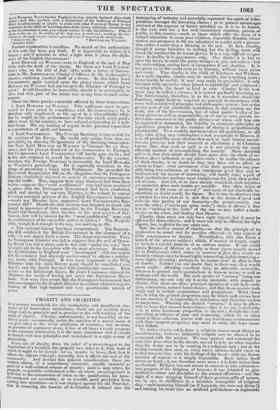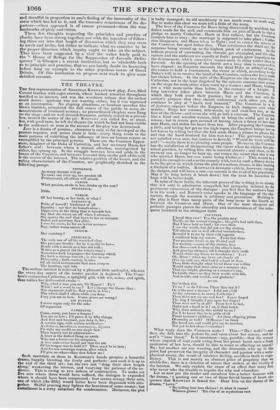CHARITY AND CHARITIES.
Ix a country remarkable for the multiplicity and munificent character of its benevolent institutions, there are yet wanting many things both in principle and in practice to the well-working of the spirit of charity. Charity, unfortunately, is not invariably an unmixed good ; occasionally, under the sanction of a sacred name it can give effect to the worst attributes of injustice ; and because, on grounds of sentiment alone, it him at all times a ready passport to the common admiration, it is the more important that it should be fenced with true principles and maintained in a right course of proceeding.
Every act of charity, from the relief of a street-beggar to the foundation of a hospital, has properly two sides to it, from both of which it ought to be viewed : for we require to know, first, how it affects the objects relieved ; secondly, how it affects the rest of the community. And besides this general consideration, there are various ()fliers, of a subordinate character, equally essential as parts of a well-ordered scheme of charity ; such as may relate, for example, to possible subinduced evils—as where encouragement is held out to the commission of crime as the qualification for benefits rendered: too covetable ; or to possible good precluded from coining into operation—as it was charged against the old Poor-law, that in removing the horrors of destitution it relaxed also the mainspring of industry and materially repressed the spirit of independence amongst the labouring classes ; or to present advantages attained at the expense of future mischief, as, it is to be feared, is the case with not a few well-intentioned charities, private or public, in this country—such as those which offer the boon of a refined education to some poor children, especially females, whose station and prospects in life are calculated to render such a possession rather a curse than a blessing in the end. In fact, charity; though it seems beholden to nothing but the feeling, must still
thank the intellect for its truest glories. It is a very dyieult occupation ; its facility is in appearance only. One thinks it is but to
open the heart, to untie the purse-strings—to pity and relieve : but the undertaking, ending here, is incomplete if not abortive. It is not given us in this world even to be humane, without some pains and study. True charity is the child of Kindness and Wisdom. As a mere impulse, charity may be amiable, but is nothing more ; it can hardly be useful; it may very easily be prejudicial: it only becomes truly operative when joined to knowledge and judgment ;
wanting which, the heart is kind in vain. Charity in the best sense may be called a science ; it is indeed gradually becoming so. The Government, therefore, in as far as it exercises charitable functions, might fairly be required to proceed in accordance with some well-considered principles and philosophic system : but as the greater part of the charitable institutions in this country are the work, not of the Government, but of other public bodies of in-. , ferior power as well as responsibility, or of one or more private in. dividuals—oinateurs in the public service—of whom still less can be expected or demanded, the liability to erroneous principles or • injudicious practice in the exercise of charity is proportionately considerable. To a wealthy and benevolent old gentleman, or old lady, who, dying, may contemplate a task acceptable to Heaven, it .• is in all probability inure obvious that such or such human easualties are grievous and their removal or alleviation a fit Christian labour, than that such or such is or is not precisely the most . effectual method of accomplishing the remedy. More doubtful still is it, that their minds should have gone over the circle of reflection above indicated, or any;other circle : to realize the objects of their charity, is as much as they may have wit to effect, or s reason to hope : what extraneous evils their operations may possibly bring into existence, or what contiguous good they may be inadvertently the means of destroying, will hardly make a part of their meditations—perhaps more conspicuous for piety than political wisdom. And yet, as we have already remarked, such inquiries are essential, since such results are possible. One often hears of "striking at the roots of an evil ;" and many of our charitable in• stitutions no doubt justify the figure. But it may be observed that a hatchet has two ends to it, and that as the stems of good and evil—in this garden of our humanity—lie promiscuously, one near the other, ("mixtaque spina rosis,") there is always a fear lest in "striking at the roots" of the one we may inflict a backstroke on the other, and destroy that likewise.
Charity, then, must not only have right objects, but it must be efficient for those objects ; and it must not only be efficient for right objects, but inefficient for any other sort. Into the motive causes of charity—so that the principle of its application be sound and its practice effectual—it may appear of little consequence to inquire. Nevertheless, this also forms a branch of the present subject ; which, if treated at length, ought to include a carefid analysis of so curious matter. If one could obtain Returns of Motives as easily as those (more usually moved far in Parliament) which relate to matters of fact, they would no doubt in various ways be found highly interesting, highly surprising_ even highly diverting; perhaps in no matter more so than in this of charity. Neither can one doubt that, in their way, they would prove useful ; affording excellent data, no otherwise accessible, whereon to ground one's speculations in human nature as well as dealings with time world. But such species of " returne " being not forthcoming, one can only say it seems probable, with respect to charity, that there are three principal agencies at work in it—religion, ostentation, natural benevolence ; and that these operate both singly and in certain conjunctions and proportions. What these are, or what the general proportion may be which such causes bear to one another, it is impossible to determine, and therefore useless to conjecture. Wanting the desired "returns," it may be allowable to hope that natural benevolence—that is to say, real charity —is in some handsonie proportion to the rest ; though time overspreading pestilence of cant and insincerity, which we so often assail in these columns, (never with any truculence commensurate with their rampant progress,) may seem to make the hope somewhat forlorn.
To derive charity solely from a religious source must always be unsatisthetory, however intimately religion amity be allowed to be connected with the subject. We may approve and commend the man who gives alms in the streets, moved to it by no other impulse than his desire not to be wanting in a religious duty ; but. as for fueling towards that man, as every man's actions should cause us to feel towards Mtn, with the feelings of the heart—with any human emotion of regard—it is simply impossible. Such action itself shows no heart ; it. can therefore move none ; it is little better than mechanical. Religion was not meant to convert us into automata— into puppets of the kingdom of heaven ; it was intended to give method to virtue and discipline to the natural affections : and the sight of a man stripping himself of these gracious gifts of nature, one by one, in obedience to a mistaken conception of religious duty—unhuusanizing himself (as if humanity too were not divine!) aud turning his heart into an artificial petrifaction—is deplorable and dreadful in proportion to one's feeling of the immensity of the error which has led to it, and the txcessive remoteness of its departure—when approach is of course presumed—from the true landmarks of piety and virtue. These few thoughts respecting the principles and practice of charity have been strung together, not with the intention of following them out into that length of discussion which they may seem to merit and invite, but father to indicate what we conceive to be the proper direction which inquiry ought to take on the subject. They have been suggested by a visit the writer lately paid to the " House of Refitge for the Suppression of Juvenile Delinquency " in Glasgow ; a recent institution, but so admirable both as to principle and practice, that we can hardly doubt its becoming before long an example to the other populous towns of Great Britain. Of this institution we propose next week to give some detailed account.



























 Previous page
Previous page